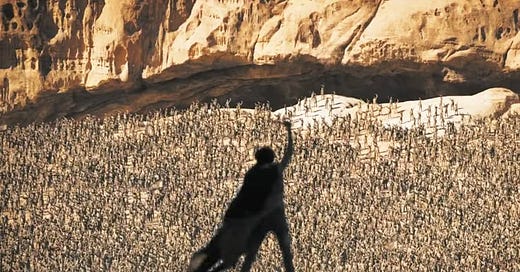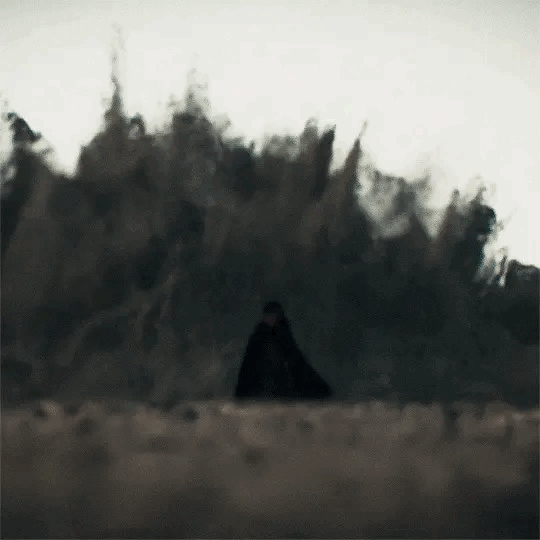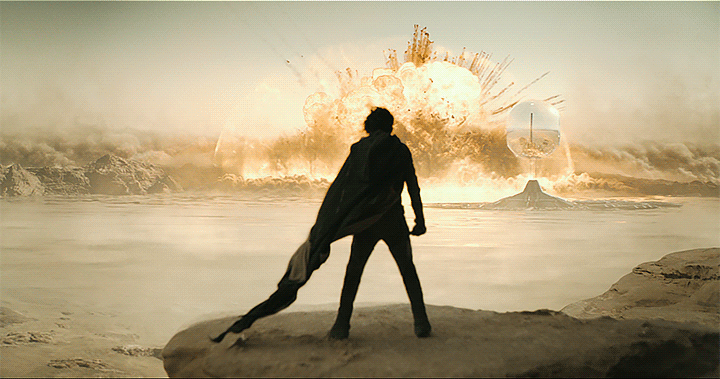Dune and the Cycle of Oppression
Why did the Emperor choose this path? And who will our next oppressors be?
Don’t trust leaders to always be right. I worked to create a leader in this book who would be really an attractive, charismatic person, for all the good reasons, not for any bad reasons. Then, power comes to him. He makes decisions. Some of his decisions made for millions of people, millions upon millions of people, don’t work out too well.
~ Frank Herbert (NBC Interview)
The focal point of the Dune franchise is the warning that blindly following charismatic leaders inevitably leads to ruin. In Dune, Paul Atreides’s appeal is curated by the Bene Gesserit, who for centuries have been planting the tale of the Kwisatz Haderach on Arrakis, the tale of the one who will save humanity.
Due to Paul’s growing prescient vision in the first novel, the Fremen bestow the title of Lisan Al-Gaib (Voice from the Outer World) onto Paul, making him their leader. They believe that he is the Kwisatz Haderach and that he will be able to bring paradise back to their home planet. Paul inevitably becomes their messiah as he fulfills each step of the Bene Gesserit’s prophecy.
Ironically, the Fremen are once again oppressed under the guise of freedom promised to them by their messiah. Their beliefs trap them - for 12 years they killed millions under the Muad’Dib’s name, believing that the holy war insurrected would free Arrakis, and at large, humanity. This brings up the topic of the cycle of oppression in Dune: one that occurs due to external circumstances and one that occurs due to internal circumstances.
Oppression Due to External Circumstances
Plans within plans within plans with plans.
Dune (1965)
Arrakis is the only planet in the Dune universe that grows spice, also known as melange. This substance allows navigators and other spaceships to travel through space efficiently, making it the most valuable resource in the Dune universe. The spice trade is controlled by a company called CHOAM. It is an analogy for how oil-producing and oil-dependent countries cooperate to influence the global oil market and maximize profit via OPEC (Organization of the Petroleum Exporting Countries).
Though CHOAM, those who control Arrakis become extremely wealthy as they can stockpile spice. During their time governing Arrakis, the Harkonnens did exactly this, making them one of the wealthiest Houses in the Imperium. This directly mirrors the oil conflicts of our world; the oil crises during the Cold War display how economics is guided by the calculus of politics. For example, in the 1970s, the Arab oil-producing cut oil exports to pressure the West during the Yom Kippur War. Supported by the Soviets, this led to a sharp rise in crude oil prices, causing a global energy crisis. Spice in the Dune franchise is similarly used as leverage against different parties due to its value. Those who manage to stockpile spice to increase their wealth can gently steer the flow of profit amongst the Houses within CHOAM.
However, as the control over Arrakis is given over to Atreides, Duke Leto Atreides hopes to truly collaborate with the Fremen to harness what is called ‘desert power’ to further fortify the Atreides’s control over Arrakis. The Atreides, unlike the Harkonnens, saw the benefit of working together with the locals instead of ruling them with an iron fist like the Harkonnens did. Working together would mean less resistance towards spice harvesting, allowing them to run spice operations smoothly. But let’s call a spade a spade, right? Even if the Atreides did work together with the Fremen that would not mean the Fremen would be seen as equals. There would still be a degree of subordinacy expected from even the highest-ranking Fremen as the Atreides imposed their own system over Arrakis, even if they did so as delicately as possible. The ways of the Fremen would still be compromised under the Atreides’ rule, as it had been under the Harkonnens’.
However, none of this comes to fruition as the Padishah Emperor Shaddam IV calls for the extermination of the Atreides on Arrakis due to their growing influence over the rest of the Houses. Paul and his mother, Jessica, manage to escape said extermination; the first piece on the chessboard to move towards the becoming of a messiah. The sparks of the Kwisatz Haderach propaganda begin to be fanned as Paul and Jessica find refuge amongst the Fremen, thus causing the oppression of the Fremen due to internal circumstances.
Oppression Due to Internal Circumstances
This prophecy is how they enslave us!
Dune: Part Two (2024)
In my opinion, Denis Villeneuve’s decision to change Chani’s character in the films brought out Frank Herbert’s message of Dune more poignantly than anyone else.
In the film, there are two Fremen factions - ones who are deeply religious, and the others who reject religion. In Dune, the religion, prophecy, and Bene Gesserit propaganda are all entwined. The southern Fremen specifically, being highly religious, believe in the arrival of a messiah that will free Arrakis from the ecological disaster and bring back paradise to their home, i.e. flora and water will flourish on Arrakis once more.
Chani is a leading voice of the faction of the Fremen who reject religion wholly. She firmly believes in the Fremen being the ones to free themselves - not an outsider. An outsider freeing the Fremen only means that the cycle of oppression that they have been going through would continue endlessly. Following a messiah would mean their beliefs and hopes would be entirely pinned on a singular person.
The YouTube channel Genetically Modified Skeptic has a great video on the religious psychology of Dune, which explores the socio-cultural workings of the Fremen. A large part of exploring how the Fremen operated was understanding the costly signaling theory regarding religion. Costly signaling theory, in regard to religion, refers to “hard-to-fake signs of commitment beyond the simple profession of faith”.
For the Fremen, these “hard-to-fake signs of commitment” include not consuming their dead’s water but preserving it in large communes of water for when the Lisan Al-Gaib arrives to lead them to paradise. Water scarcity is a central issue in Arrakis, where the Fremen have adapted around this by wearing stillsuits that preserve their body’s water for their limited consumption. If they carry extra water, like Jessica and Paul did when they first met the Fremen, this water must be rationed amongst the Fremen. It’s almost blasphemous to keep water to oneself.
In Dune: Part Two, Princess Irulan says:
Reports from the south of Arrakis arrive rarely. These are barren, burnt lands hidden by sandstorms which stretch a thousand miles across the equator. Nothing can live there without faith.
This line explains precisely why the Fremen are so religious. In harsh environments, be it geographically, socially, or politically, religion acts as a glue in a society, bringing people together by providing guidelines that give them a sense of community. The southern Fremen, swayed by the prophecy, truly believed in a messianic figure who had great power (such as Paul’s prescient vision) that would repel any oppressor from ravaging their planet once more. However, the idea of being saved by an outsider is what limited their worldview. By believing in the Kwisatz Haderach tale, they didn’t push for a Fremen-centred revolution and instead carried on attacking spice harvesters without truly opening their eyes to the real issue at hand. Unfortunately, their faith ended up blinding them, unwittingly propagating the cycle of oppression.
This is what Chani tries to continuously voice out throughout the Dune movies - the Fremen need to be freed by their own to be truly free. Even the kindest leader, like Duke Leto, would continue the cycle of oppression on Arrakis, simply because he’s a foreign presence whose sole purpose is to extract as much spice as possible for his House’s gain, as it is with all invaders.
The combination of external politics over spice and the Fremen’s own faith thereby leads to a cycle of oppression on Arrakis. As Jessica says in the novel:
When religion and politics travel in the same cart, the riders believe nothing can stand in their way. Their movement becomes headlong - faster and faster and faster. They put aside all thought of obstacles and forget that a precipice does not show itself to the man in a bland rush until it's too late.
The Fremen’s desire to survive and free their world was the very thing that ended up betraying them in a world where everything was controlled by those with the most power. Frank Herbert’s Dune is indeed a cautionary tale against charismatic leaders - even if they promise the world, do not follow them blindly.







